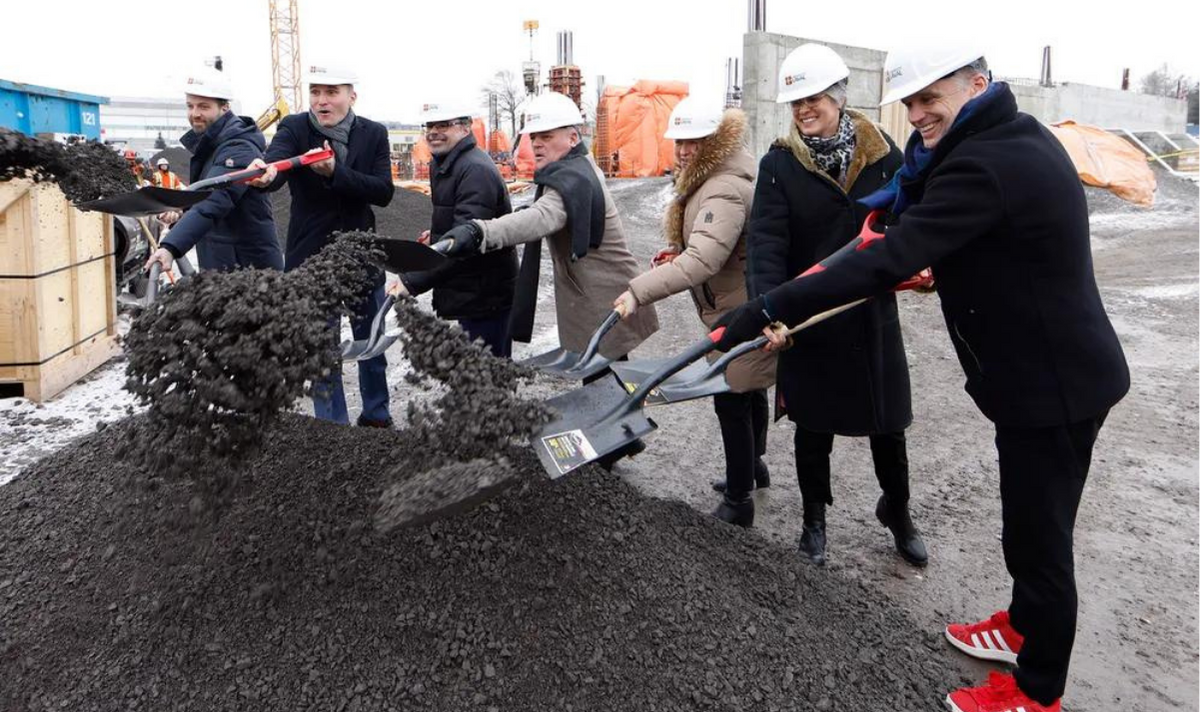Published on February 22 2024 In INQ Community
Construction begins on Institut nordique du Québec’s Scientific Complex

PRESS RELEASE
Quebec City, February 22, 2024 - Université Laval and Institut nordique du Québec (INQ) are proud to break ground on the new Scientific Complex. Valued at $105 million, the construction was made possible thanks to the financial support of the governments of Quebec and Canada, as well as the City of Quebec.
Scheduled to open in 2026, the INQ Scientific Complex will become a hub for northern research in Canada and around the world. The research emanating from this environment of exchange and innovation will contribute to the sustainable development of the North.
"Université Laval is a university of impact, and this is absolutely true when you think about the leadership of our teams working in northern research. For more than 60 years, Université Laval has been bringing together the major players in northern and Arctic research, and the construction of the Scientific Complex is part of this tradition. INQ unites fifteen postsecondary institutions with more than 270 researchers. The four Indigenous peoples who inhabit northern Quebec, the Inuit, Cree, Innu and Naskapi, are also represented. “INQ will now have a strong foothold on the Université Laval campus,” said Université Laval Rector Sophie D'Amours.
"Université Laval is a jewel of the Quebec City region, and today's announcement consolidates its place as a world-class public francophone teaching and research institution. Institut nordique du Québec’s new Scientific Complex will foster research development and knowledge sharing to help us build a stronger, more sustainable country. Once again, Quebec is setting itself apart by capitalizing on its Francophonie and nordicity to attract talent and strengthen our economy," said Jean-Yves Duclos, member of parliament for Quebec City and Canada’s Minister of Public Services and Procurement.
The new complex will provide the INQ community with state-of-the-art analytical platforms. For example, researchers will be able to replicate northern and Arctic climatic conditions in a laboratory setting, test remotely operated underwater vehicles (ROV) in a specialized tank, and prepare and coordinate missions in spaces fully dedicated and adapted to the specific needs of these expeditions.
"The INQ Scientific Complex at Université Laval represents a significant commitment to the advancement of higher education in Quebec. It is an innovative project that promotes the training of the next generation of scientists and prepares students to face the unique environmental, social and cultural challenges of the North. By encouraging the co-creation of projects in partnership with northern communities, we are creating a new generation of researchers who are aware of the importance of collaboration and sustainability in their scientific work," said Pascale Déry, Quebec’s Minister of Higher Education.
"Institut nordique du Québec will provide decision-makers, northern communities and the private sector with the scientific and technical knowledge needed for the sustainable development of Quebec's northern territory. Research and innovation play an essential role in the understanding and sustainable development of the North and its communities. Société du Plan Nord is firmly committed to fulfilling this mission," added Maïté Blanchette Vézina, Quebec’s Minister of Natural Resources and Forests and Minister responsible for Société du Plan Nord.
Knowledge sharing will also be promoted through collective spaces that will be used by the entire Arctic and northern research community. These spaces are designed to educate and increase the awareness of the public about the realities of the North. A space for visitors and Indigenous partners will welcome them and bring together local and scientific knowledge.
"I am proud to see Institut nordique du Québec take shape in the Capitale-Nationale region on the Université Laval campus. We have worked very hard over the past few years to make this ambitious project a reality. It contributes to the development of Quebec and positions the province as a world leader in research and innovation. The spin-offs will have a positive impact at local, national and international levels," said Jonatan Julien, Quebec's Minister of Infrastructure and Minister responsible for the Capitale-Nationale region.
The Mayor of Quebec City, Bruno Marchand, emphasized that "there's nothing better for a healthy society than the fact that it's based on science. Today, we're announcing that our city and our university will have a stronger voice in northern research around the world. It's because of the work that will be done here that we will all move forward together. We have the expertise and knowledge to continue to shine in the scientific world and to provide data to those who want to contribute to a world focused on sustainable development. We have much to be proud of!”
The framework for scientific work in the North is unique. The social and cultural context, and challenging physical environments, which are bearing the full brunt of the effects of climate change, require special efforts.
"The accelerated transformation of northern environments is redrawing the contours of social and economic development and adds to the multiple challenges already affecting northern inhabitants and their well-being. Today, we are equipping ourselves with concrete means to better understand and anticipate these changes, propose sustainable solutions and increase our collective resilience. In this respect, the meeting, creation and dissemination spaces integrated into the complex will encourage the co-construction of projects with northern communities and the training of a new generation of students and professionals equipped to work in the North," says Jean- Éric Tremblay, professor in the Department of Biology at Université Laval and the director of INQ.
Translated by INQ from the original French language version:
Source :
Relations publiques et protocole Université Laval
418 656-3355
Back to news

